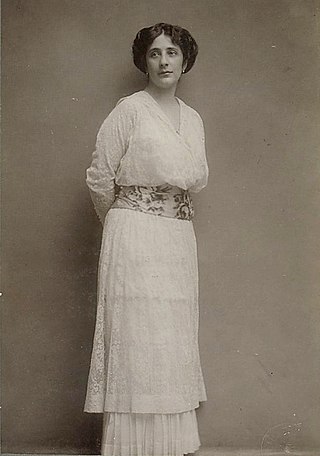
Christine Mielitz (born 23 November 1949) is a German theatre and opera director. [1]

Christine Mielitz (born 23 November 1949) is a German theatre and opera director. [1]
Born in Chemnitz, Mielitz was the daughter of a Chemnitz concert master and therefore came into contact with music theatre at an early age. After finishing school, she studied opera directing with Götz Friedrich and Hans-Jochen Irmer at the Hochschule für Musik "Hanns Eisler" in East-Berlin from 1968 to 1972.
In the course of her studies Mielitz completed an internship with Harry Kupfer at the Dresden State Opera, which initially led to work as an assistant to Kupfers from 1973 and where she became a director from 1980. In the same year Verdi's Nabucco premiered in Wuppertal was her first own production. From 1982 she acted at the Dresdner Staatsoper as head director.
In 1989 she was engaged as a director at the Komische Oper Berlin, where she also took over as head director in 1992. From 1998 to 2002 she was artistic director of the Meiningen Court Theatre. In Meiningen she achieved a great international success with the first performance of the Der Ring des Nibelungen on four consecutive days, as Wagner always wished.
From 2002 to 2010 Mielitz was opera director of the Theater Dortmund. Since then she has worked as a guest director at the Vienna State Opera and the Dresden State Opera. [2]

Cheryl Studer is an American dramatic soprano who has sung at many of the world's foremost opera houses. Studer has performed more than eighty roles ranging from the dramatic repertoire to roles more commonly associated with lyric sopranos and coloratura sopranos, and, in her late stage, mezzo-sopranos. She is particularly known for her interpretations of the works of Richard Strauss and Richard Wagner.

Dame Gwyneth Jones is a Welsh dramatic soprano, widely regarded as one of the greatest Wagnerian sopranos in the second half of the 20th century.
Harry Alfred Robert Kupfer was a German opera director and academic. A long-time director at the Komische Oper Berlin, he worked at major opera houses and at festivals internationally. Trained by Walter Felsenstein, he worked in the tradition of realistic directing. At the Bayreuth Festival, he staged Wagner's Der fliegende Holländer in 1978 and Der Ring des Nibelungen in 1988. At the Salzburg Festival, he directed the premiere of Penderecki's Die schwarze Maske in 1986 and Der Rosenkavalier by Richard Strauss in 2014.

Bernd Aldenhoff was a German Heldentenor.

Melbourne Opera was founded in 2002 as a charitable not-for-profit company dedicated to producing opera and associated art forms in Melbourne, Victoria. With philanthropic assistance it has also toured to outer-suburban and regional Victorian theatres, as well as to Canberra and Hobart interstate. Despite receiving no government funding since its foundation, the company mounts between three and five main stage productions each year. Its principal rehearsal and performance home is the Athenaeum Theatre.
A dramatic soprano is a type of operatic soprano with a powerful, rich, emotive voice that can sing over, or cut through, a full orchestra. Thicker vocal folds in dramatic voices usually (but not always) mean less agility than lighter voices but a sustained, fuller sound. Usually this voice has a lower tessitura than other sopranos, and a darker timbre. They are often used for heroic, often long-suffering, tragic women of opera. Dramatic sopranos have a range from approximately low A (A3) to "high C" (C6). Some dramatic sopranos, known as Wagnerian sopranos, have an exceptionally big voice that can assert itself over a large orchestra (of more than 80 or even 100 pieces). These voices are substantial, often denser in tone, extremely powerful and, ideally, evenly balanced throughout the vocal registers. Wagnerian sopranos usually play mythic heroines. Successful Wagnerian sopranos are rare and often Wagnerian roles are performed by Italianate dramatic sopranos.
Susan Owen is an American operatic soprano. Born in Salisbury, North Carolina, she earned a Bachelor of Music degree from East Carolina University in 1980 and a Master of Music degree from the University of Texas at Austin in 1983. In 1990 she won the Metropolitan Opera National Council Auditions. From 1995 to 1999 she was a member of the Staatstheater Kassel, Intendant Michael Leinert. From 1999 to 2002 she was a member of the Staatstheater Darmstadt with Mark Albrecht.

Jonas Kaufmann is a German-Austrian tenor opera singer. He is best known for the versatility of his repertoire, performing a variety of opera roles in multiple languages in recital and concert each season. Some of his standout roles include Don José in Carmen, Cavaradossi in Tosca, Maurizio in Adriana Lecouvreur, Don Alvaro in La forza del destino, Siegmund in Die Walküre, and the title roles in Parsifal, Werther, Don Carlos, and Lohengrin. In 2014 The New York Times described Kaufmann as "a box-office draw, and... the most important, versatile tenor of his generation."
Anda-Louise Bogza is a celebrated Romanian opera soprano. In 1994, she won both the First Prize and the Audience Prize at the Vienna International Singing Competition. In 2007, she was honored with the Thalia Award.
Antonín Švorc was a Czech operatic bass-baritone. He studied with J. Berlíka at the Prague Conservatory before making his professional opera debut at the Liberec Theatre in 1955 where he was committed for one year. He joined the roster of principal artists at the National Theatre in Prague in 1956. He performed at that theatre until 1962 when he joined the Prague State Opera (PSO) where he performed for the next several decades. In 1985 he was named a People's Artist of Czechoslovakia and in 2003 he was honored with a Thalia Award. Retired from the stage, he taught on the voice faculty at the Prague Conservatory.
Wilhelm Schüchter was a German conductor. He was Generalmusikdirektor in Dortmund and left a legacy of opera recordings.

Andrzej Dobber is a Polish baritone, honored with the title of Kammersänger by the Senate of the City of Hamburg and awarded the silver medal for Merit to Culture - Gloria Artis by the Polish Minister of Culture.

Aura Twarowska is a Romanian mezzo-soprano. She was soloist of the Romanian Opera in Timișoara (1997–2010) and at the Vienna State Opera (2007–2016).
Damiano Michieletto is an Italian stage director especially known for opera. He has staged productions at leading opera houses and festivals worldwide. His awards include the 2015 Laurence Olivier Award for the production of Mascagni's Cavalleria rusticana and Leoncavallo's Pagliacci at the Royal Opera House in London.

Hermin Esser was a German operatic tenor who focused on roles by Richard Wagner, which he performed at the Bayreuth Festival and internationally.
Frank Philipp Schlößmann is a German scenic designer focused on operas who has worked at major opera houses and festivals internationally. He staged Janáček's Jenůfa at the Metropolitan Opera, Wagner's Der Ring des Nibelungen at both the Bayreuth Festival and Der Ring in Minden, and the world premiere of Heinz Holliger's Lunea at the Opernhaus Zürich.
Silvano Carroli was an Italian baritone.
Irmgard Vilsmaier is a German operatic soprano.

Bella Paalen, real name Isabella Pollak was an Austrian-American operatic soprano of Hungarian origin. She was engaged for 31 years at the k.-k. Hofoper in Vienna, later the State Opera, was appointed Kammersängerin there in 1933 and had to leave the country after the Anschluss because of her Jewish origins.
Hilde Scheppan was a German operatic soprano and academic teacher. She was engaged for 20 years at the Staatsoper Unter den Linden in Berlin and made guest appearances at the Bayreuth Festival from 1937 to 1958. She performed roles in Wagner's stage works in productions by Heinz Tietjen both in Berlin and Bayreuth. After World War II, she first continued work in Berlin, but then moved to the Staatsoper Stuttgart. She taught as a professor of voice at the Hochschule für Musik Nürnberg and the Musikhochschule München.